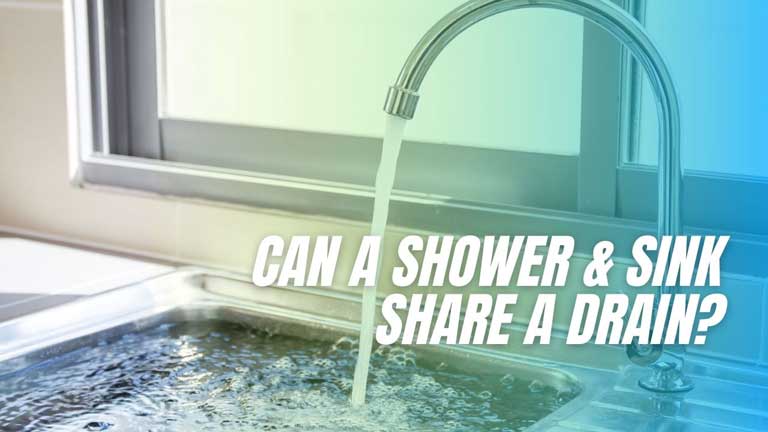Are you thinking about connecting both a shower and sink in a single drain? Or you may have been facing issues with your bathroom regarding this undertaking. Either way, you will get a hint to solve the issue.
If the shower and sink share the same drainage, you might face bath gurgling, which can be irritating. When the drainage pipeline gets clogged, airlocks form and cause this gurgling sound. And who would want to hear weird sounds on Monday morning?
Well, you won’t like them at all, nor do I. To keep you well aware of the issues that can happen due to the sharing of the same drain, we have spent significant amount of time researching and writing this article. So, let’s dive in!

Can a Shower and Sink Share a Drain?
Yes, they can. But sharing the same drain by both shower and sink requires proper mapping and planning of the plumbing lines. Doing things wrong here can cause a lot of issues that require expensive fixes.
Here are some of the issues that can appear if a shower and sink share a drain imperfectly-
Blockage
Imagine how irritating it can be when the drainage water comes out of your sink or bath. If you do not understand why then you must confirm whether the outlets of sink, bath or toilet are connected to one drainage pipe. Drainage issues are a headache as unclogging the main pipeline is difficult for many people.
The dirt, skin flakes and hairs combine with soap and stick to the walls of the drain pipes. If the drain system of the bath and sink are connected, then the clogging would affect the flow of water from the bath-tub and sinks. While one major problem of blocked drains is foul-smelling water, another is the damage to wirings or electrical fittings.
Thus, a professional plumber can give a quick check to the drainage map of your bathroom.
Bath Gurgling
The glug-glug sound in your bathroom is not normal. However, it can occur due to many reasons but one of the reasons is sharing the same drain by sink and bath.
Many people complain that if bath and sink are connected to the same pipe then, bath gurgling occurs. This occurs due to hair balls clogging into the drain. When you empty the sink, the drainage water starts burping out of the bath. Hence, you hear the glug-glug sound.
To solve this problem, call a professional plumber and check whether clogging has occurred in the main pipeline or not.
Read Also: Should You Tile Shower or Walls First?
Airlocks
If water flows out of the shower or sink with less pressure then it can be due to airlocks that are formed in the main drainage area. The air bubbles can trap in the main pipeline which limits the flow of water significantly.
When the pipeline of sink and bath is connected then the water pressure inside the pipe increases. Due to a rush of water from both the drainage outlets, pockets of air are formed in the higher point of the main pipeline.
Airlocks can be fixed by placing air release valves that automatically open and lets the air come out. When complete air is released from the pipe, the valve automatically closes
Slow Drains
A sluggish drain is the main problem of many baths and sinks. If you have a smaller bathroom, then plumbers mostly connect the drainage pipeline of the bath and sink together. As a result, if no proper venting is done then it can lead to trapping of the waste materials, especially in the P-traps.
If the P-traps are partially clogged, then water slowly drains out. But if it is wholly blocked, then wastewater does not flow into the main pipeline and instead of draining it out, the water overflows. However, a quick tip for you to manage slow drains is using a plunger to create pressure and loosen the clogging.
Fatberg
The dirty water being drained into the main pipeline results in the formation of fatberg. A fatberg is a big fat globule that forms when the oil, grease, fats or anything that is drained combine. These dirty bergs accumulate in the sewage pipes and when the mass solidifies, a fat berg is formed. This fat berg can clog the main pipeline easily.
If the bath and sink drainage pipelines are connected, then there are chances that fatberg accumulation might increase. Therefore, clogging your pipes soon. However, you can dissolve these fat globules by pouring a mixture of hot water and vinegar.
Conclusion
All in all, these are some of the highlighted problems that can occur if the drainage system is interconnected without proper venting. The good news is that you can temporarily fix all these problems but if they occur repeatedly, then a proper call to a professional plumber is needed.
Leave a Reply